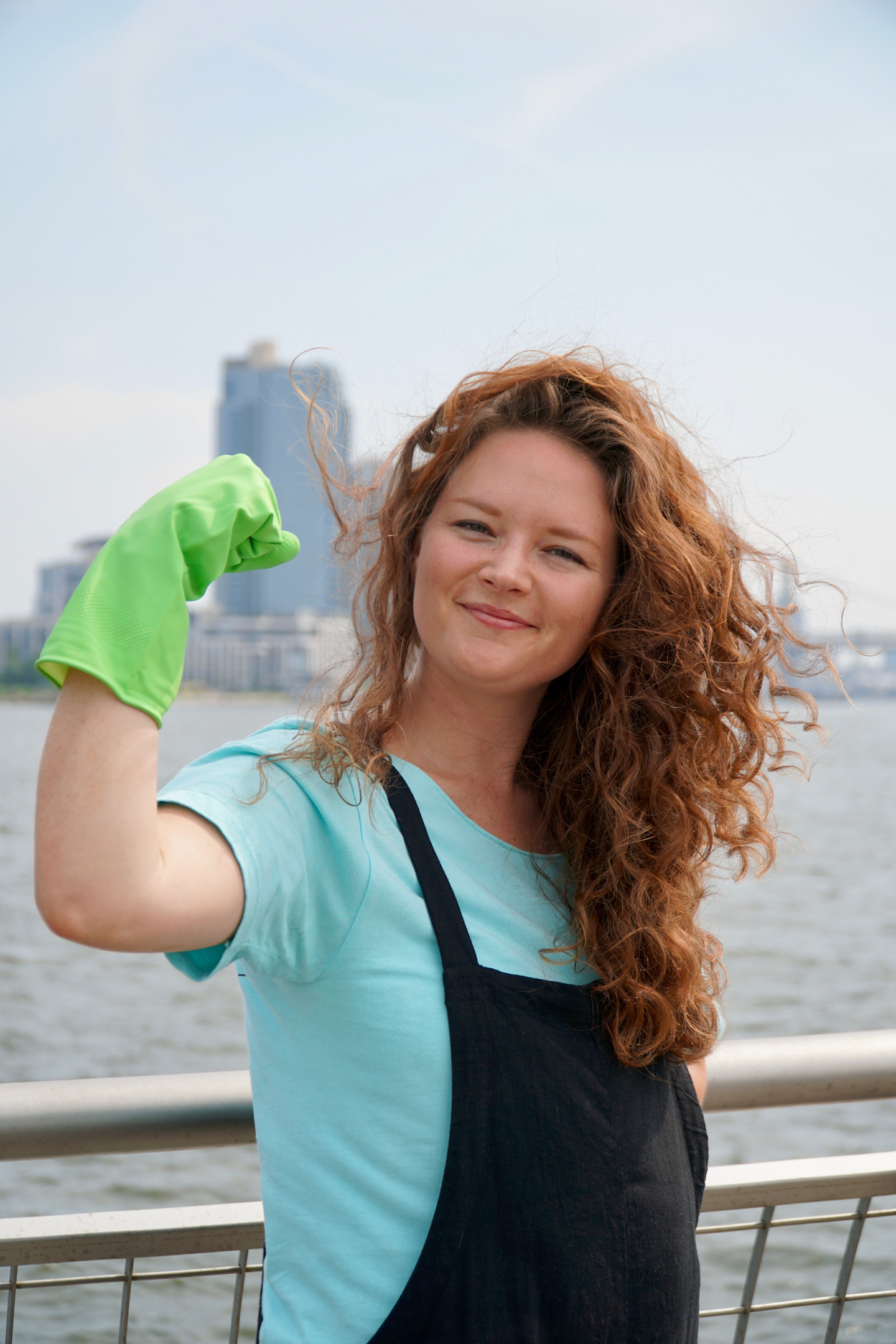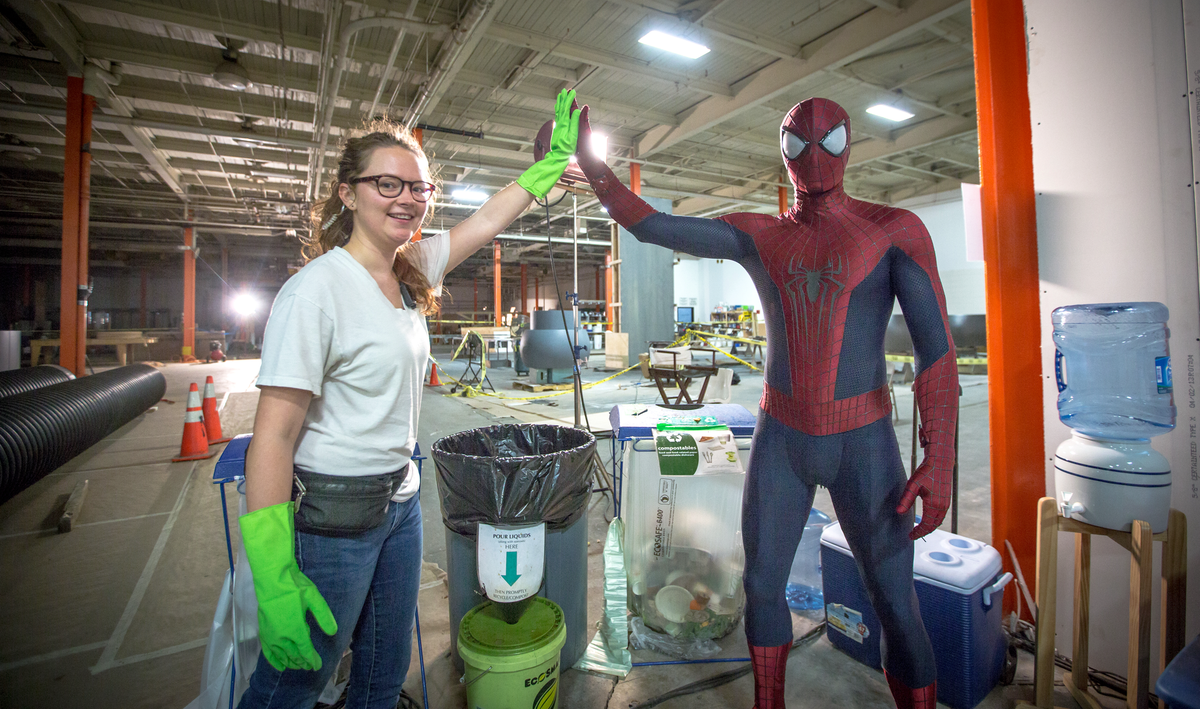Sustainability has long been a hot topic in the event industry, but with the increased challenges of the COVID-19 pandemic—and the accompanying single-use flatware, latex gloves, disposable masks and more—it can be especially hard to navigate right now.
One person staying on top of these challenges is Emellie O’Brien, the founder and CEO of Earth Angel. Founded in 2013, Earth Angel creates customized sustainability programs for a wide variety of entertainment and event productions; the Brooklyn, NY-based company, which has branches in Los Angeles and Atlanta, has greened more than 50 sets—including Black Panther, The Marvelous Mrs. Maisel, The Amazing Spider-Man 2 and other feature films, TV shows, commercials and live events.
O’Brien notes that the average entertainment production uses 74,000 water bottles and 52,000 gallons of fuel, and is responsible for 63 trees being cut down and over 520,000 airlines flown. Earth Angel combats that environmental impact by providing an on-set eco department, including fully trained “Eco PAs,” along with rentable zero-waste kits with bins, labels and signage. The company also runs eco labs—keynotes and workshops that train production teams or businesses on how to integrate sustainable practices—and the “Good Riddance” program, which redirects unused materials to the local community. In 2020, Earth Angel launched a COVID response package, which helps productions meet COVID compliance standards in an eco-friendly way.
 Emellie O’Brien is the founder and CEO of Earth Angel.Photo: Courtesy of Earth AngelBizBash caught up with O’Brien to discuss what her work is like on set, how her best practices translate to the event world, her number-one sustainability rule and more.
Emellie O’Brien is the founder and CEO of Earth Angel.Photo: Courtesy of Earth AngelBizBash caught up with O’Brien to discuss what her work is like on set, how her best practices translate to the event world, her number-one sustainability rule and more.
Where did your passion for sustainability come from, and how did that lead to the launch of Earth Angel?
Sustainability started for me as a Girl Scout, actually—the “leave no trace” philosophy really made an impression on me as a kid. I was also strongly influenced by the movie Erin Brockovich, the story of an ordinary woman fighting against corporate pollution for a better environment and healthier communities. The fact that one film can influence the life trajectory of a young girl—well, that’s the power of this industry. I studied Film at NYU and started to engage more with environmental and social justice issues, becoming more politically aware, and I just knew my work had to contribute somehow to solving this enormous crisis. Once I discovered the burgeoning intersection of entertainment and environment, that was it for me. I knew I found my calling.
Can you describe the work you do on sets?
Earth Angel is a sustainable production service provider with experts providing the strategy, skilled labor, supplies and analytics to reduce the environmental impact of entertainment. We create customized green production programs and solutions, making sets safe and sustainable for feature films, television series, commercials and live events. These programs take the form of staffing trained Eco PAs to manage on-site sustainability, renting zero waste kits for composting and recycling, coordinating the repurposing of props/costumes/custom scenery, seminars and trainings, and environmental impact reporting.
How does your process change when you’re working on live events?
There is substantial overlap. Our focus in terms of sustainability priorities doesn’t change—we still strive for a zero-waste, clean energy-powered, net-zero carbon program. What really shifts is the timescale and labor. A one-day event with hundreds of people requires more of our Eco Crew on site than a film production with a crew of 75 shooting over several months. We still recommend a lot of the same vendors and do our best to educate everyone involved, but you of course don’t see the trends of how you are progressing as readily with a few days versus a few months.
Tell me about your COVID response package. Why was that offering a natural tie-in to a sustainability-focused business?
At Earth Angel, we are all about taking the burden of sustainable production logistics off of our shows. COVID compliance naturally added even more barriers for shows to adopt sustainable practices, so we launched our Clean and Green program to provide a) a revitalized Eco PA labor force now trained in set safety and sanitization; and b) a vendor partner network with both COVID-safe and sustainable products/services for our shows. We’re seeing a really great response to this fusion of health and safety and sustainability, and a real deepening of the understanding that we are in a convergence of crises at the moment. Just because we are in a pandemic does not mean we get to ignore the climate crisis; we have to walk and chew gum at the same time.
With new COVID precautions like individually wrapped flatware, there’s a lot of concern about losing the forward progress the event industry was making in terms of sustainability. What tips or solutions would you recommend to live event producers?
There is still so much progress that can be made. For example, the pandemic has caused a lot of folks to revert back to single-use plastics out of hygiene concerns, despite the fact that many environmental scientists warn that the virus lives longer on plastics than most other surfaces. So with touchless water dispensers and folks keeping their own reusable bottles/cutlery, it is still absolutely safe to use reusables. There are also great innovations in terms of clean energy that producers can take advantage of. Using renewable diesel fuel to curb emissions, or solar-powered battery storage units in lieu of diesel generators, are initiatives that we really need to prioritize.
What’s the number-one sustainability rule you think every event producer should be following?
Start somewhere. Make a commitment on one event—maybe to eliminate single-use plastics, or start composting, or track your carbon footprint. Assess what worked and what didn’t, and then grow from there. The Sustainable Events Alliance also has a ton of great resources for producers to take advantage of to implement these solutions.
If we’re going to create a habitable future for life on earth, we need to shift culture. Entertainment is the most influential way to shift culture. Film, television, events—they move people. We have not leveraged our industry enough in the fight against climate change, and I think we can unlock massive change if we collaborate and mobilize toward sustainability.
Click here to see original post

